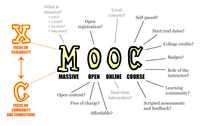
Photo from wikipedia
The massive open online course (MOOC) is emerging as the new paradigm for modern education. The success of MOOCs depends on learners’ continued usage. Drawing upon the information systems success… Click to show full abstract
The massive open online course (MOOC) is emerging as the new paradigm for modern education. The success of MOOCs depends on learners’ continued usage. Drawing upon the information systems success model (IS success model) and technology acceptance model, a theoretical model for studying learners’ continuance intentions toward participation in MOOCs was developed. Based on survey data from 294 respondents, structural equation modeling was employed to assess the model. The results of this analysis indicate that system quality, course quality, and service quality were significant antecedents of the continuance intention of individuals, and the effect of course quality and service quality were mediated by perceived usefulness. The results contribute to the extant literatures in the context of MOOCs learning by identifying the critical quality factors, and provide managerial guidelines for MOOCs utilization and generalization. The implications of the present findings for research and managerial practice are discussed.
Journal Title: Educational Technology Research and Development
Year Published: 2017
Link to full text (if available)
Share on Social Media: Sign Up to like & get
recommendations!